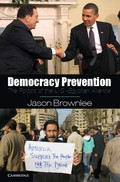Conclusion
Published online by Cambridge University Press: 05 November 2012
Summary
In 2009, a Council on Foreign Relations study speculated that if new leaders took power in Egypt, “Washington would no longer be able to rely on Cairo to undertake initiatives that are profoundly unpopular with the Egyptian people.” U.S. presidents from Carter to Obama have counted on their Egyptian counterparts to do the “profoundly unpopular.” Since 1979, U.S. and Egyptian leaders have advanced U.S. strategic goals in the Middle East (namely, Israeli security and U.S. influence in the Persian Gulf) while forestalling democracy in Egypt. Public discourse and internal deliberations show top decision makers interested in political reform and this book does not charge individuals in either government with hypocrisy. But the promotion of democracy and other altruistic aims has come second to a strategic vision that depends on autocratic continuity. Bilateral peace between Egypt and Israel required Sadat to rule with an iron fist while shackling Egyptian dissidents. Authoritarianism kept public opinion in check and held Egypt's position in the United States’ strategic framework.
Two years after the Council on Foreign Relations paper, popular protests threatened to raise Egyptians’ interests above U.S. security demands. The January 25 Revolution showed that the hypothetical threat of a potential electoral victory by the Muslim Brotherhood misconstrued Washington's dilemma. On one hand, conservative Islamic rule did not preclude alignment with U.S. geostrategy. The United States worked closely with the orthodox Kingdom of Saudi Arabia. In Egypt, the United States’ “problem” was not with Islam but with the people. Democratically elected governments, whether they were led by Islamists or secularists, could review Egypt's relations with its allies. Therefore the specter of “one man, one vote, one time” mattered less to U.S. primacy than did the prospect of repeated voting and new foreign policies.
- Type
- Chapter
- Information
- Democracy PreventionThe Politics of the U.S.-Egyptian Alliance, pp. 154 - 178Publisher: Cambridge University PressPrint publication year: 2012



